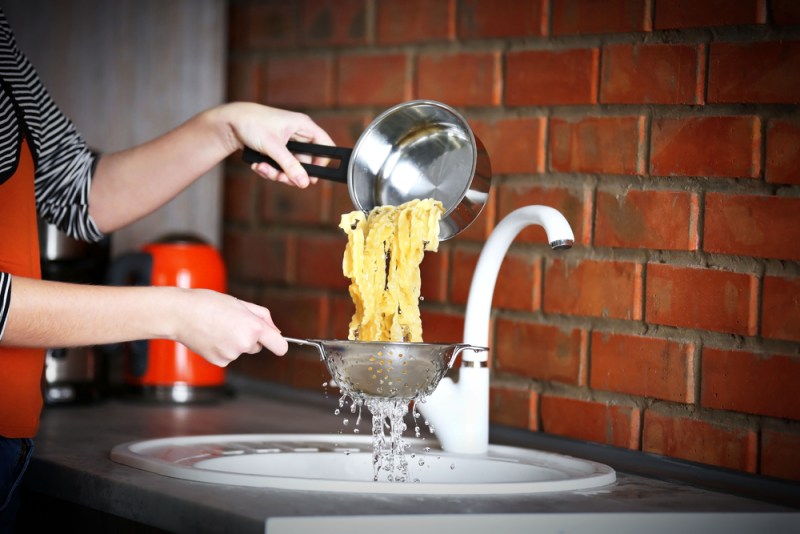Pasta is one of the easiest dishes to cook. All you have to do is boil the noodles to a perfect al dente, grab a colander, and drain the water in the sink, right? Wrong. According to pasta connoisseur, Missy Robbins of Brooklyn’s Lilia, draining your pasta in the sink is a culinary faux-pas. Here’s why:
Never Strain Pasta Noodles Into The Sink

Robbins explains that when you drain the cooking water into the sink, you lose the precious cooking water that makes your pasta dish better. Specifically, the cloudy liquid is filled with salt and leftover starch. When combined with a hot fat like olive oil or butter, it turns into a smooth and silk coating–this process is called emulsification. The extra water on your pasta ensures that sauce and noodles stick together like glue. In addition, it can be used as a thickening agent for watery sauce and doesn’t alter the taste like most thickening methods. Therefore, incorporating pasta water could take your pasta dish from mundane and to Michelin star level.
To save the water, Robbins recommends inserting a pasta basket in the pot. Also, you can remove the pasta from the pot with tongs, a spider strainer, or a large spaghetti spoon. Tongs are perfect for long pasta like fettuccine or spaghetti, a spider is great for shorter noodles like penne, Gemelli, or orecchiette, while a spaghetti spoon works well for both types of pasta. Another tip Robbins gives is to work fast as you pull the pasta out of the water.
You’re not limited to using this starchy water for pasta, as you can use this as a stock for gravy, soup, and rice. You can even use it to water your plants! The starch in the water stimulates the release of plant nutrients in the soil.

Additional Tips for the Perfect Pasta
Don’t Use Too Much Water

Contrary to the belief, you don’t need a pot full of water to cook your pasta. Only use as much water as you need for how much pasta you make. It is recommended that you use only a quart and a half (six cups) of water when boiling pasta. Don’t worry, the noodles won’t stick together by using less water.
Get A Little Saucy

Another tip is to be sure that you don’t overdo it with the sauce. Robbins recommends that you use one and a half to two cups of sauce per pound of pasta. Also, she advises not to pour the sauce on top, you should add the pasta to a pan of simmering sauce. This way the pasta absorbs more flavor.
